Related Research Articles

Moorfields Eye Hospital is a specialist NHS eye hospital in Finsbury in the London Borough of Islington in London, England run by Moorfields Eye Hospital NHS Foundation Trust. Together with the UCL Institute of Ophthalmology, which is adjacent to the hospital, it is the oldest and largest centre for ophthalmic treatment, teaching and research in Europe.

Dr Joseph Sampson Gamgee, MRCS, FRSE was a surgeon at the Queen's Hospital in Birmingham, England. He pioneered aseptic surgery, and, in 1880 invented Gamgee Tissue, an absorbent cotton wool and gauze surgical dressing.

St. Jude Children's Research Hospital, founded in 1962, is a pediatric treatment and research facility focused on children's catastrophic diseases, particularly leukemia and other cancers. The hospital costs about US$2.8 million a day to run, but patients are not charged for their care. It is located in Memphis, Tennessee, and is a nonprofit medical corporation designated as a 501(c)(3) tax-exempt organization by the Internal Revenue Service. St. Jude treats infants, children, teenagers, and young adults up to the age of 21, and in some cases, up to the age of 25.
Heart Research UK is a national charity organisation in the United Kingdom. They fund medical research in to the prevention, treatment and cure of heart disease, as well as community projects aimed at improving the public’s heart health. Since its foundation, Heart Research UK has funded over £25 million of research into heart disease and related conditions.
The British Red Cross Society is the United Kingdom body of the worldwide neutral and impartial humanitarian network the International Red Cross and Red Crescent Movement. The society was formed in 1870, and is a registered charity with more than 17,200 volunteers and 3,400 staff. At the heart of their work is providing help to people in crisis, both in the UK and overseas. The Red Cross is committed to helping people without discrimination, regardless of their ethnic origin, nationality, political beliefs or religion. Queen Elizabeth II is the patron of the society.
London's Air Ambulance Charity is a registered charity that operates a helicopter emergency medical service (HEMS) dedicated to responding to serious trauma emergencies in and around London. Using a helicopter from 08:00 to sunset and rapid response vehicles by night, the service performs advanced medical interventions at the scene of the incident in life-threatening, time-critical situations.

Royal Brompton Hospital is the largest specialist heart and lung medical centre in the United Kingdom. It is managed by Guy's and St Thomas' NHS Foundation Trust.
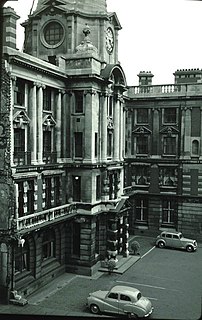
Manchester Royal Infirmary is a hospital in Manchester, England, founded by Charles White in 1752. It is now part of Manchester University NHS Foundation Trust, sharing buildings and facilities with several other hospitals.
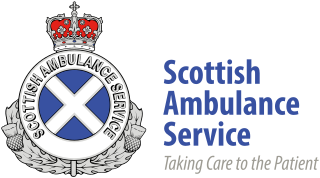
The Scottish Ambulance Service is part of NHS Scotland, which serves all of Scotland's population. The Scottish Ambulance Service is governed by a special health board and is funded directly by the Health and Social Care Directorates of the Scottish Government.

The South Western Ambulance Service NHS Foundation Trust (SWASFT) is the organisation responsible for providing ambulance services for the National Health Service (NHS) across South West England. It serves the council areas of Bath and North East Somerset, Bournemouth, Christchurch and Poole Council, Bristol, Cornwall, Devon, Dorset, Gloucestershire, North Somerset, Plymouth, Isles of Scilly, Somerset, South Gloucestershire, Swindon, Torbay and Wiltshire.

The Yorkshire Ambulance Service NHS Trust (YAS) is the NHS ambulance service covering most of Yorkshire in England. It is one of ten NHS Ambulance Trusts providing England with emergency medical services as part of the National Health Service it receives direct government funding for its role.

The East of England Ambulance Service NHS Trust (EEAST) is an NHS trust responsible for providing National Health Service (NHS) ambulance services in the counties of Bedfordshire, Cambridgeshire, Essex, Hertfordshire, Norfolk and Suffolk, in the East of England region. These consist of approximately 6.2 million people across an area of 7,500 square miles (19,000 km2).

The West Midlands Ambulance Service University NHS Foundation Trust (WMAS) is responsible for providing NHS ambulance services within the West Midlands region of England. It is one of ten ambulance trusts providing England with emergency medical services, and is part of the National Health Service.
Sobell House Hospice is an Oxford-based hospice serving the residents of Oxfordshire, England affected by life-limiting illness.
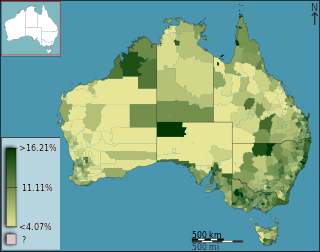
Health care in Australia is primarily funded through the public Medicare program and delivered by highly regulated public and private health care providers. Individuals may purchase health insurance to cover services offered in the private sector and further fund health care. Health is a state jurisdiction although national Medicare funding gives the Australian or Commonwealth Government a role in shaping health policy and delivery.
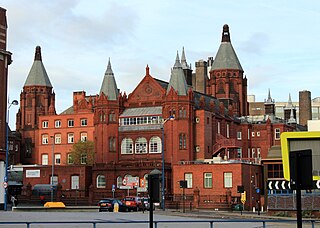
Birmingham General Hospital was a teaching hospital in Birmingham, England, founded in 1779 and closed in the mid-1990s.
The Hindu Mission Hospital is a 220-bed multidisciplinary health facility in Chennai, India. Spread over an area of 74,000 sq ft, the ISO 9001:2000-certified hospital is registered under Society Act of Tamil Nadu.
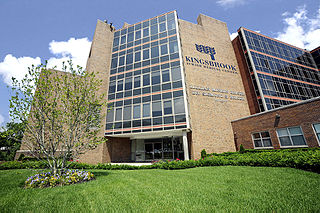
Kingsbrook Jewish Medical Center is a 303-bed full-service community teaching hospital with an estimated 2,100 full-time employees, located in the neighborhood of East Flatbush in Brooklyn, New York. The hospital is made up of a complex of eight conjoined buildings which are dispersed over a 366,000 square foot city block.
The Queen Elizabeth Hospital Charity exists to support medical and health research, and to encourage excellence in healthcare for patients and their carers, wholly or mainly through the services provided by University Hospital Birmingham NHS Foundation Trust. It raises money for campaigns that are over and above what the NHS can provide. QEHB Charity was formed in 2001, however there has been an official charity associated with the Queen Elizabeth Hospital since the creation of the NHS in 1948. The charity will become independent in April 2016.

The COVID-19 pandemic has greatly impacted the international and domestic economies. Thus, many organizations, private individuals, religious institutions and governments have created different charitable drives, concerts and other events to lessen the economic impact felt.
References
- 65 Years' History of the Birmingham Saturday Holiday Fund 1873-1938, Journal Printing Office, Cannon Passage, Birmingham, 1938
- Best of Health - 130 Years of BHSF 1873-2003, Peter J. Maskell, 2003 (Downloadable PDF copy)